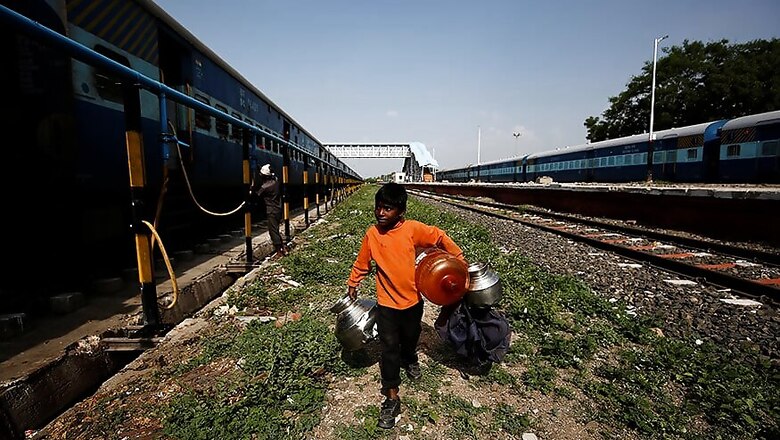
views
Dantewada: One of the most heart-wrenching stories of the past one month of lockdown was the death of 12-year-old Jamlo Madkam. She had walked almost a hundred and fifty kilometres from a chilli field in Telangana, where she had gone to work, to her home in south Bastar's Bijapur district in Chhattisgarh. But Jamlo had died just 14 kilometres short of her home due to exhaustion and dehydration.
When News18 went to the ground to report this story in detail, it found that Jamlo's tragedy had started way before her death on the morning of April 18. And that 100 other children, who also worked as farm labourers like Jamlo, have returned from Telangana and Andhra Pradesh to their homes in Naxal-overrun districts of Bastar on foot during the current lockdown period. One of them is just 7 years old. She walked 250 kilometres from a field in Andhra Pradesh, where there was nothing to survive on during lockdown, to her house in Kakadi village.
Jamlo Madkam's story
She was the eldest of the four children of Endoram and Sukamati Madkam, who lived in in Bijapur's Aded village. Jamlo studied up to class VI regularly but dropped out of school the following year because her friends had also stopped showing up. Endoram and Sukamati lived on the produce of their small farmland which was just enough to fill their bellies. But it wasn't sufficient for six people. They were always in need of money.
Endoram says that on February 2, Jamlo abruptly left for Telangana's chilli fields with a group of other villagers — nine women and three men. The harvest season for the chilli crop had started in December and would go on till April-May. This is the time when a lot of adivasis, including children, from Chhattisgarh go to work in the farms of the two adjoining states, Andhra Pradesh and Telangana.
"She did not tell anyone at home. She just left with them. Jamlo had never talked about being a farm labourer. This was her first time out of the house," her father said.
Jamlo's uncle Sunil Mandavi said, "A lot of people leave for the fields of Andhra Pradesh and Telangana because there is no work here. Jamlo's family was quite poor. They were in bad shape most of the time. But nobody knows how Jamlo made up her mind to go. She did not discuss this with anyone."
Aded village is among the poorest and least accessible among the Naxal-overrun regions of Bastar. It lies in a forest from which the nearest road is a 14 kilometre-long trek which takes about five hours.
On February 2, Jamlo walked this stretch for the first time in her life to earn money. Was she moved by the anxiety of her parents who were always struggling to make ends meet, or did she have any other dream? No one knows for sure. But she did tell one of her fellow travellers that she wanted to return home after two months.
She found a job in a chilli field in Telangana's Perur district. It was back-breaking work. Those who worked from sunrise to sunset earned Rs 250 a day. Those who worked from sunrise to afternoon were paid Rs 150 per day. At the end of the season, each worker was paid their wages and given a sack of chillies.
On March 24, Prime Minister Narendra Modi announced a nationwide lockdown. Everything came to a standstill, including public transport. For the adivasi farm labourers, there was nothing to do in their fields. No money to be made and nothing to buy the daily bread with. Like most other migrant workers, they too were anxious to return to their homes, where they at least wouldn't die of hunger.
After waiting for nearly three weeks, on April 16, a group of adivasi labourers from Bijapur decided to walk it home. Jamlo joined them. The first day of walk was gruelling, some of those who were in that group say, but at least everyone was in shape to press on further. On the afternoon of the second day of their walk, Jamlo fell and sprained her ankle.
"People who were with her say she was screaming in pain. For some time they halted the walk but when she found she couldn't walk any further, one of the men decided to carry her on his back," Sunil, her uncle, said. The group had covered around 100 km in those two days and had reached Bijapur's Bhandaarpal village by night. Now they were just 18 kilometres away from home. They had carried along some dry ration which they cooked twice a day. Soon after dinner that night, Jamlo threw up. She complained of stomach pain which, in addition to the pain in her ankle, left her quite miserable through the night. At about 8 am on April 18, she died.
Since they were still walking through hilly forest areas, the labourers had to carry her body for an hour till the nearest village Modakpal where the closest motorable road was. Nobody within that group had a phone, so they used a local villager's phone to call an ambulance.
The administration soon put the entire group in quarantine. Jamlo's body was sent for post-mortem. A sample of her blood was also sent for a Covid-19 test. It came back negative. Dr BR Pujari, senior doctor at Bijapur's primary health clinic, said that Jamlo had died due to electrolyte imbalance which was caused by dehydration. Chhattisgarh chief minister Bhupesh Baghel announced Rs 1 lakh ex gratia compensation to her family.
A sum of Rs 13,500 was found in Jamlo’s bag. She had been paid Rs 200 per day for her two months of work, plus overtime. The 12 year old child had done 9-10 hour shifts as a farm labourer in hot sun every day of the week for eight weeks.
Story of the other child labourers
When News18 started speaking to villagers who had recently returned from the farms of Telangana and Andhra Pradesh, it found that, within Dantewada alone, at least 50 children who had gone to work in farms had returned to the district during the past one month (names of children hereon have been changed to protect their identities). Local authorities peg the total number of adivasis who are 18 years or younger from villages in south Bastar, who just returned on foot from the chilli fields of the two states at around 100.
News18 traced and spoke to the families of six girls and two boys, all below 18 years of age, who had walked hundreds of kilometres through unforgiving hilly, forest terrain to reach their homes in the last few days.
Joga is just 7 years old, but she already knows what intense hunger and fear feel like and what it is to walk 250 kilometres from a chilli farm in Andhra Pradesh, where she went to work a few months ago, back to her home in Kakadi village. Her father had died some time ago, forcing Joga into manual labour while her mother did odd jobs to make ends. Joga returned to her village two days ago.
Three young girls aged 10, 13 and 15 from one village, Bengpal, returned from chilli fields in Andhra Pradesh's Gannavaram village a few days ago. Fifteen-year-old Lakhmu is still exhausted and dehydrated, her family says.
In Khuntapal village near Kuankonda block, two girls aged 14 have just returned from a chilli farm in Andhra Pradesh on foot. In Karka village on the other side of Indravati river, Tulle, who lost both his parents, went to a farm in Andhra Pradesh to earn money to support his grandparents and his younger brother. He has also made the extraordinary return journey on foot. Local authorities estimate that 2,800 people from nearby villages are still stuck in Andhra Pradesh and Telangana.




















Comments
0 comment